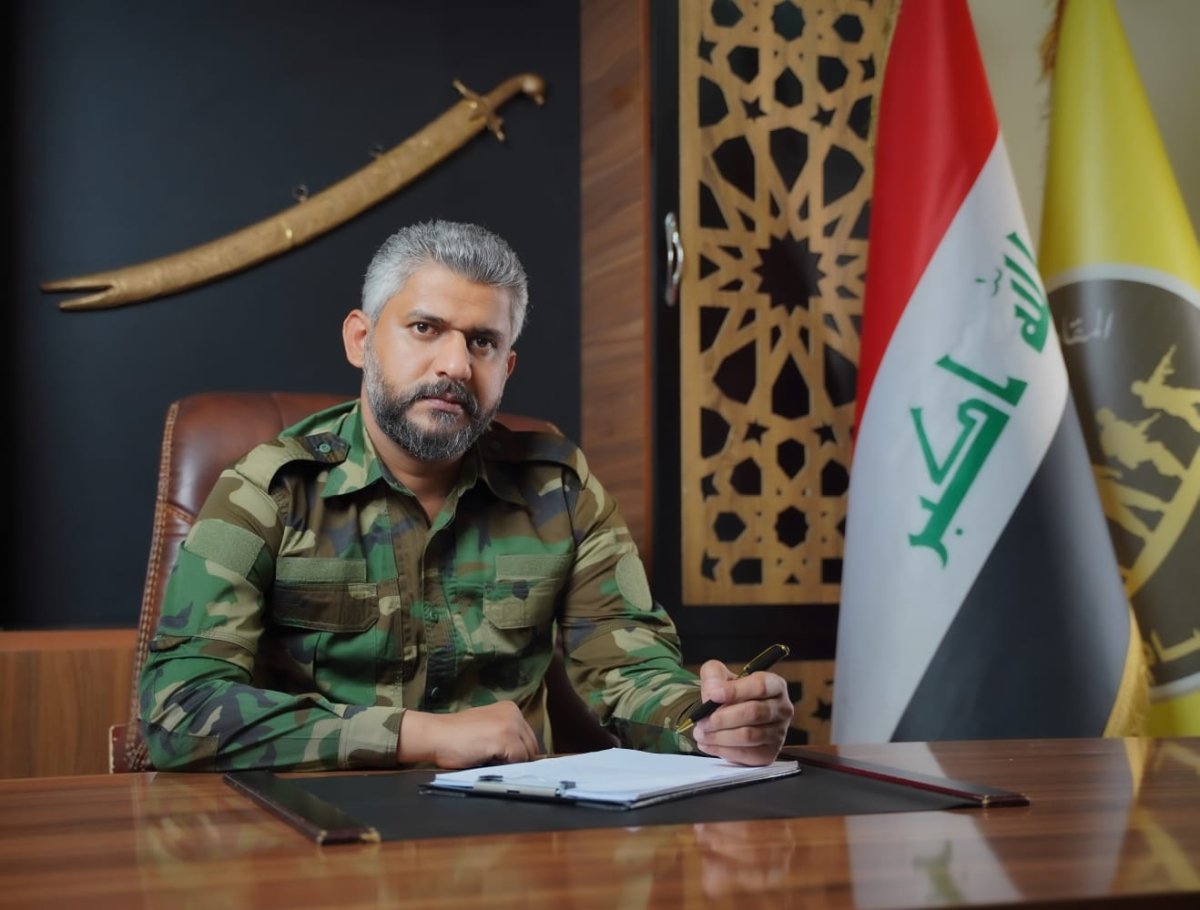
Iraq Militia Warns US Troops Will Exit ‘in Coffins’ If Biden Won’t Withdraw
Published Mar 27, 2024 at 9:41 AM EDTUpdated Mar 27, 2024 at 11:40 AM EDT00:43
Joe Biden Angers Iraq With Airstrikes Against Kataib Hezbollah
By Tom O’Connor
Senior Writer, Foreign Policy & Deputy Editor, National Security and Foreign PolicyFOLLOW
The head of an Iraqi militia participating in a coalition of groups that have waged attacks against U.S. troops and Israel has told Newsweek that his forces are prepared to escalate their campaign significantly if President Joe Biden does not meet their demands.
According to Sheikh Mohammed al-Tamimi, secretary-general of Faylaq al-Waad al-Sadiq, all they are asking for is the complete withdrawal of U.S. forces from their country.
The group, whose name translates to the “True Promise Corps,” is one of several factions that have banded together as part of the “Islamic Resistance in Iraq,” which launched a campaign of near-daily rocket and drone attacks against U.S. forces stationed in Iraq and Syria in October, shortly after the war between Israel and Hamas erupted in the Gaza Strip.
The offensive took a deadly turn in January when three U.S. soldiers were killed on the border of Jordan and Syria.
As unrest worsened with Biden ordering intensive airstrikes and the killing of a high-level militia commander last month, the Iraqi government began to harden its calls for a timely exit of U.S. forces. The Pentagon soon commenced talks with Iraqi counterparts over a “transition” in the U.S. military presence, which is officially limited to battling the remnants of the Islamic State militant group (ISIS).
With these assurances, a number of Islamic Resistance in Iraq militias largely paused their campaign, instead turning their sights on Israel itself. But as weeks pass with little sign of progress and reports of new attacks on U.S. positions, Tamimi has warned U.S. troops will be met with an offensive that goes far beyond even Hamas’ devastating October 7, 2023, attack on Israel should “the reckless, senile” Biden ultimately fail to withdraw U.S. soldiers from the country.
“If the agreement is not achieved, we will expel the Americans in their coffins from Iraq, and we will humiliate the ‘Black House’ administration,” Tamimi told Newsweek. “And they will see who the resistance is and what the capabilities of the resistance are, especially now that we have drones and long-range smart missiles.”
The Rise of Iraq’s Shiite Militiamen
The presence of largely Shiite Muslim militias threatening U.S. troops in Iraq is not a new phenomenon and predates the Israel-Hamas war by more than two decades. When the U.S.-led invasion of Iraq in 2003 toppled President Saddam Hussein, rival Shiite and Sunni Muslim factions took up arms to target one another and U.S. forces viewed as occupiers in the war-torn nation.
While U.S. troops did ultimately exit in late 2011, unrest erupted once again with the rise of the ultraconservative Sunni ISIS, which took over large swathes of the country, declaring a global caliphate from Iraq’s second city of Mosul in 2014. Mostly Shiite Muslim militias banded together with support from Iran to tackle the jihadis in Iraq and Syria, while the U.S. formed an international coalition, backed by U.S. boots on the ground, to take on the same foe.
Faylaq al-Waad al-Sadiq was among the groups that engaged in frontline battles against ISIS in both Iraq and Syria during these years.
For a time, the fight against ISIS served as a mutual goal between factions backed by the U.S. and Iran, but militias once again rose up against U.S. troops as tensions between Washington and Tehran worsened. Tit-for-tat hostilities came to a head in early 2020, with the U.S. killing of Islamic Revolutionary Guard Corps Quds Force commander Major General Qassem Soleimani and the second-in-command of Iraq’s paramilitary Popular Mobilization Forces coalition, Abu Mahdi al-Muhandis, in Baghdad.
Soleimani is often credited as the architect of the Axis of Resistance, whose influence extends as far as the frontlines of Ukraine, where Faylaq al-Waad al-Sadiq’s media channel shared photos last month appearing to show Russian soldiers in Avdiivka carrying a flag carrying the slain commander’s face along with another bearing the symbol for the Russian city of Stary Oskol. Soleimani’s death sparked vows for revenge among his international supporters.
Today, the war in Gaza has served as a new catalyst for anti-U.S. operations. Various groups such as Kataib Hezbollah, the Nujaba Movement and others have united to form the Islamic Resistance in Iraq, of which Tamimi said Faylaq al-Waad al-Sadiq and its mujahideen, a term referring to Muslim guerilla fighters, were also “an essential part.”
“The role of the mujahideen in the corps is to defend the land of Iraq, and this is a right guaranteed by divine laws and international treaties,” Tamimi said. “For the leadership and mujahideen of the corps, targeting the American occupation in Iraq is a legitimate, national and moral duty, and Iraq’s sovereignty is a duty that everyone must respect.”
“The role of the corps’ mujahideen was to target any clear American presence and target the Zionist entity,” he added.
Newsweek has reached out to the Pentagon for comment.